Contents
Weigela Sunny Princess attracts attention thanks to the gentle, light tone of not only flowers, but also leaves. The plant is not capricious, although without care the decorative effect is reduced. The shrub takes root well in the middle lane, if you take care of shelter for the winter.
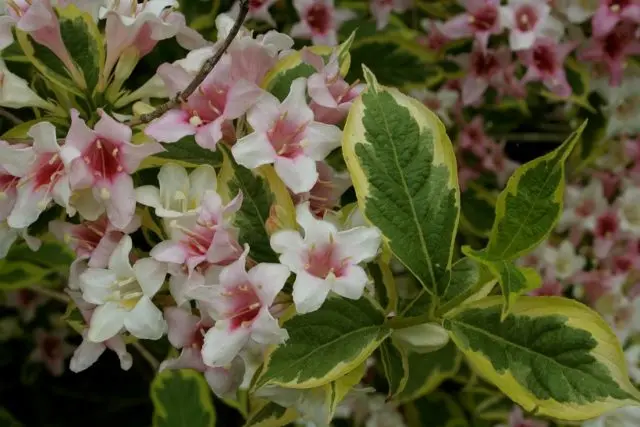
Description of blooming weigela Sunny Princesses
The bush of the picturesque variety is compact. The spherical dense crown of the weigela Sunny Princesses, similar to a light pink cloud at the time of flowering, spreads in height and in diameter from 1 to 1,5 m. Strong shoots are straight, slightly drooping in the upper part. The root system is superficial, compact, requiring moderately moist and loose soil. The leathery leaves of Sunny Princess Weigela, as seen in the photo, are oblong, ovate, 4-8 cm long, with a sharp tip. The variety is distinguished by a yellowish border on the leaf blades, which gives the bush a special charm. Thanks to this coloring, Sunny Princess weigela remains decorative throughout the warm season, and in winter it enchants with smooth bends of shoots.
The shrub develops well on loose, fertile soils with sufficient moisture. Requires sunny exposure or openwork shade. Weigela is moisture-loving, withering in severe drought. Frost resistance reaches -28 ° C, young plants need shelter. Adult bushes endure the winters of the middle lane in a cozy place, protected from the northern winds. After freezing, the plants are restored due to new shoots. Weigela retains its decorative appearance for up to 30 years.
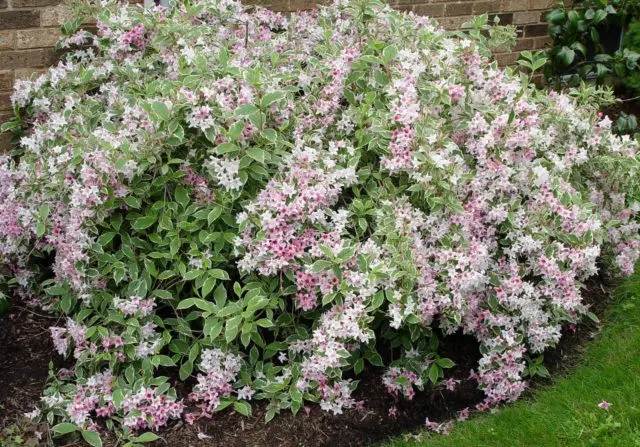
How weigela Sunny Princess blooms
The buds of the Sunny Princess variety begin to open by the end of May, but more often flowering takes place in June and July. The length of the tubular, slightly elongated weigela bells in the narrow part is from 4 to 5 cm. The flowers are light pink, of a delicate shade, the petals have a frame of a more intense tone. Weigela forms inflorescences of 3-7 elongated bells. The bush also pleases with a subtle fragrance. Abundant spring-summer flowering after appropriate pruning is replaced by autumn, which begins at the end of August and lasts throughout September. Then an achene is formed – a box with small seeds that are viable for a short time.
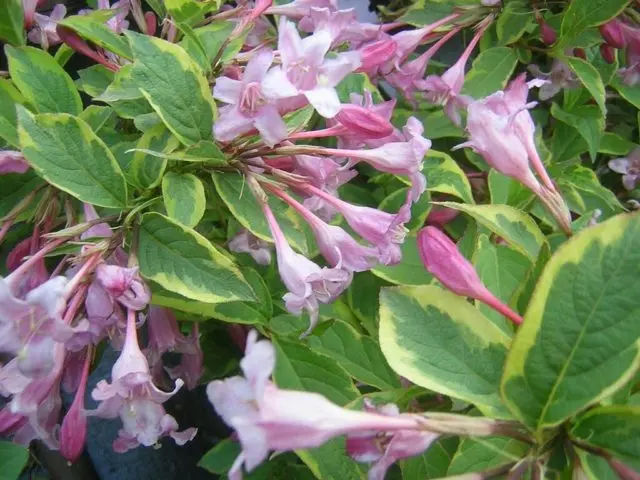
Application in landscape design
A picturesque, shimmering combination of light green leaves and graceful buds make Sunny Princess one of the most ornamental garden shrubs. Weigela revitalizes a garden of any style. Thanks to the picturesque leaves, the Sunny Princess variety looks interesting even outside the flowering period. In autumn, the bush changes color to warm orange-reddish tones, and the graphics of gently curved shoots also catch the eye in winter. Gardeners use weigela to their liking:
- decoration of the lower part of buildings, fences, retaining walls;
- framing the garden area;
- creating a hedge;
- addition of a strict composition of coniferous shrubs;
- spectacular tapeworm or group on the lawn.
The Sunny Princess variety is in harmony with low junipers, spireas, rhododendrons, barberries. As an underliner, irises, daylilies, hostas, and other low-growing flowers are suitable.
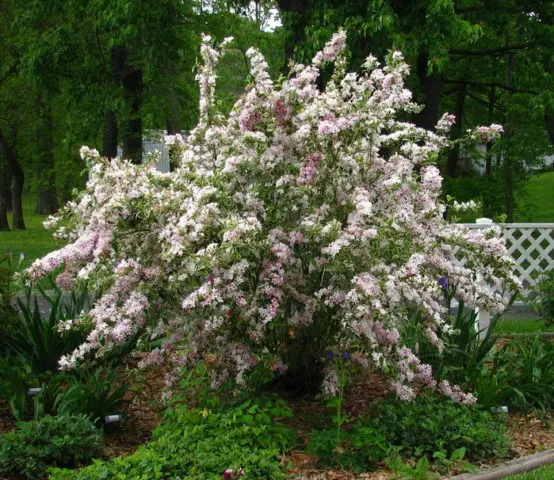
Breeding methods
According to reviews, weigela Sunny Princesses is most often propagated in easy ways – cuttings and layering. In addition, sowing seeds and dividing a large bush is used. The cuttings are cut after flowering, selecting green young branches of 13-15 cm each:
- put in a growth stimulator according to the instructions;
- planted obliquely in a substrate of sand and peat, deepening by 1-2 cm;
- the container is covered with foil.
Every day the container is opened, the cuttings are sprayed with warm water. Rooting occurs in 1,5-2 months. The plants are planted in a permanent place next spring.
For layering, choose the lower branch, which is placed in the groove and strengthened with a garden bracket. Shoots are planted in a year. The fastest way to get a flowering weigela is to divide the roots of an adult plant. The disadvantage of propagation by seeds is that varietal characteristics may not develop in seedlings.
Planting and caring for weigela Sunny Princesses
The good development of the shrub and abundant flowering depend on the right place and planting time.
Recommended timing
In the middle lane, weigela is planted in spring – in March, early April. Over the summer, the bush will take root and painlessly endure the winter. October is suitable for the southern regions.
Site selection and preparation of soil
Planting and caring for the weigela blooming Sunny Princesses will be less of a hassle if the place is correctly chosen initially:
- windless;
- sunny;
- not in the valley;
- with breathable, drained and fertile soil.
How to plant
A seedling with an open root system is soaked before planting for 3-6 hours in water with the addition of a growth stimulator according to the instructions. Weigela in containers is well watered or put the pot in a large container so that the substrate is moistened and the roots are not damaged. The landing pit should exceed the volume of the container by 2 times: 50-60 cm deep, with the same diameter:
- drainage up to 10-15 cm high;
- a fertile substrate is made up of equal parts of garden soil and humus, half of a part of sand for looseness and complex fertilizer;
- weigela seedlings are placed so that the root neck is at ground level or slightly deepened up to 1-2 cm;
- the bush is watered after compaction of the substrate, the trunk circle is mulched.
Growing rules
Moisture-loving weigela Solar Princess needs regular moistening and loosening of the soil.
Watering
Weigela needs abundant watering – at least a bucket of water a week in spring, before flowering and in hot summer. It is better to water with a large volume, but so that the moisture reaches all the roots.
Additional fertilizing
In the spring, it is convenient to feed weigela with any complex fertilizers with three main trace elements. They also use preparations for flowering shrubs. The granules are scattered around the perimeter of the trunk circle or diluted in water, according to the manufacturer’s recommendations. After fertilizing, weigela is watered abundantly. Weigela is given the same top dressing at the end of spring, during the formation of buds. Phosphorus-potassium agents are applied in August.
Loosening, mulching
After watering, weigels loosen the earth 6-8 cm deep. Mulching will ensure soil breathability in all weather conditions. Peat, bark, sawdust, dry grass without seeds are used as raw materials.
Pruning, crown formation
A lush weigela bush of blooming Sunny Princesses, as in the photo, is created by constant annual pruning:
- sanitary cleaning and correction of the shape of the plant is carried out in early spring by removing damaged, thickening or protruding shoots;
- in July, after the first wave of flowering, the old weigela shoots are cut by a third;
- when pruning, a point is chosen where a large external bud or a young process is laid;
- separate young powerful branches are cut in half, forming a lush bush;
- after 2-3 years, rejuvenating pruning of old branches at ground level is carried out.
Preparation for winter
The variegated variety of Sunny Princess weigela is moderately winter hardy. In late autumn, lay a thick layer of mulch. The plant is covered for the winter with agrofiber or mats made from natural materials, bending branches or arranging a high frame. Shelter is not removed in early spring, only raising the edge for ventilation. Weigela branches after frost are best shaded from bright rays.
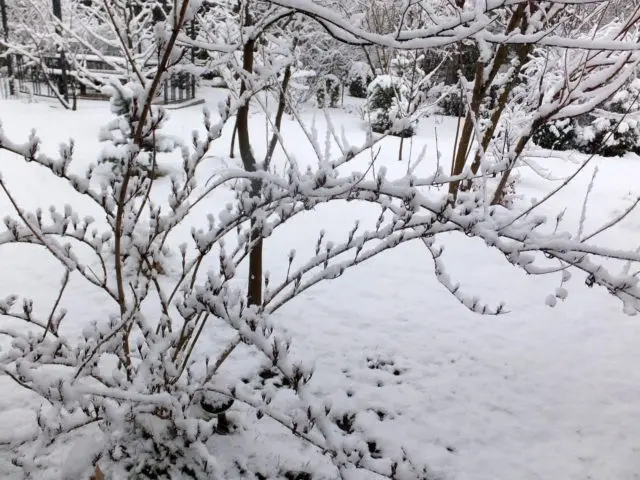
Pests and diseases
If weigela Sunny Princesses is planted in a place, according to the recommendations, the plant is strong and develops well, little susceptible to diseases. With a thickened bush, fungal infections may occur. For treatment, fungicides or Bordeaux liquid are used. Weigela is annoyed by aphids, which are disposed of by spraying with a soap or soda solution. Sometimes a spider mite is planted, against which acaricides are purchased. Caterpillars of various pests die after being treated with insecticides.
Conclusion
Weigela Sunny Princesses will delight with exquisite flowering and original variegated leaves with a well-chosen landing site. Care includes maintaining sufficient soil moisture for a shallow root system and systematic pruning. With winter shelter, the plant develops well in the northern regions of the middle zone.









